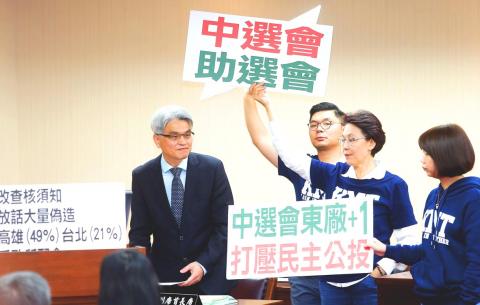The Control Yuan yesterday voted 9-3 to impeach former Central Election Commission (CEC) chairman Chen In-chin (陳英鈐) for allegedly publishing a revised version of the Executive Yuan’s opinions on referendums weeks before several referendums were held alongside the nine-in-one elections on Nov. 24 last year.
The members who voted in favor of impeachment were Eugene Jao (趙永清), Chang Kuei-mei (仉桂美), Chiang Chi-wen (江綺雯), Fang Wan-fu (方萬富), Chiang Ming-tsang (江明蒼), Yang Fang-ling (楊芳玲), Tsai Pei-tsun (蔡培村), Lin Ya-feng (林雅鋒) and Chang Jen-hsiang (章仁香). Lin Sheng-fong (林盛豐), Tsai Chung-yi (蔡崇義) and Kao Yung-chen (高涌誠) voted against.
Control Yuan member Gau Fehng-shian (高鳳仙) initiated an investigation after Chinese Nationalist Party (KMT) Legislator William Tseng (曾銘宗) and family values group Happiness of the Next Generation Alliance in November last year filed a complaint accusing Chen of breaching the Referendum Act (公民投票法) by publishing the material.

Photo: CNA
The investigation found that the commission on Oct. 24 published an initial version of the opinions regarding the referendums and on Nov. 2 last year published a second version for referendums Nos. 9 to 15, despite the act requiring them to be released 28 days in advance, the Control Yuan said in a written statement.
Chen did not convene a meeting on the matter before republishing the opinions as required by the Organic Law of the Central Election Commission (中選會組織法), the Control Yuan said.
While the Taipei High Administrative Court on Nov. 7 ruled that the commission’s republished opinions were illegal, the CEC did not withdraw them until Nov. 20, after its appeal was dismissed, the Control Yuan said.
To correct its mistake, the commission spent more than NT$9 million (US$295,994) to publish the original version of the opinions in major newspapers, causing the government financial loss and damaging its credibility, the Control Yuan said.
Chen said he respects the Control Yuan’s authority, but added that rules in the act are flawed.
Before republishing the opinions, he had consulted the commission’s Department of Planning and confirmed that there was precedent, he said, adding that the government should explain what referendum results mean as necessary.
The act forced the commission to hold 10 referendums alongside the local elections, giving it limited time to prepare, he said.
It is “regrettable” that the Control Yuan is blaming problems caused by a poor system on him alone, he said.
Of the seven referendums, three were about how same-sex marriage should be handled and two were about whether homosexuality should be taught at elementary and junior-high schools.
One was over whether to maintain restrictions on food imports from Japanese regions after the 2011 Fukushima Dai-ichi nuclear disaster and one was about whether to the national team should use “Taiwan” at the Tokyo Olympics next year.

US President Donald Trump said "it’s up to" Chinese President Xi Jinping (習近平) what China does on Taiwan, but that he would be "very unhappy" with a change in the "status quo," the New York Times said in an interview published yesterday. Xi "considers it to be a part of China, and that’s up to him what he’s going to be doing," Trump told the newspaper on Wednesday. "But I’ve expressed to him that I would be very unhappy if he did that, and I don’t think he’ll do that," he added. "I hope he doesn’t do that." Trump made the comments in

NOT AN OPENING: Trump’s violation of international law does not affect China’s consideration in attacking Taiwan; Beijing lacks capability, not precedent, an official said Taiwanese officials see the US’ capture of the president of Venezuela as a powerful deterrent to Beijing’s aggression and a timely reminder of the US’ ability to defeat militaries equipped with Chinese-made weapons. The strikes that toppled Venezuelan President Nicolas Maduro signaled to authoritarian leaders, including Chinese President Xi Jinping (習近平), US President Donald Trump’s willingness to use military might for international affairs core to US interests, one senior official in Taipei’s security circle said. That reassured Taiwan, the person said. Taipei has also dismissed the idea that Trump’s apparent violation of international law could embolden Beijing, said the official, who was not

A cold surge advisory was today issued for 18 cities and counties across Taiwan, with temperatures of below 10°C forecast during the day and into tonight, the Central Weather Administration (CWA) said. New Taipei City, Taipei, Taoyuan and Hsinchu, Miaoli and Yilan counties are expected to experience sustained temperatures of 10°C or lower, the CWA said. Temperatures are likely to temporarily drop below 10°C in most other areas, except Taitung, Pingtung, Penghu and Lienchiang (Matsu) counties, CWA data showed. The cold weather is being caused by a strong continental cold air mass, combined with radiative cooling, a process in which heat escapes from

Snow this morning fell on Alishan for the first time in seven years, as a strong continental cold air mass sent temperatures plunging across Taiwan, the Central Weather Administration (CWA) said. The Alishan weather station, located at an elevation of about 2,200m in central Taiwan, recorded snowfall from 8:55am to 9:15am, when the temperature dropped to about 1°C, the CWA said. With increased moisture and low temperatures in the high-altitude Alishan area, the conditions were favorable for snow, CWA forecaster Tsai Yi-chi (蔡伊其) said. The last time snow fell at the Alishan weather station was on Jan. 10, 2018, while graupel fell there